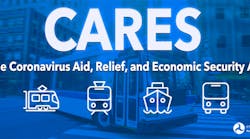TTC losing C$90 million/month; implements cost cutting measures
The Toronto Transit Commission (TTC) is implementing a series of cost cutting measures as it faces a financial crisis brought on by the drop in ridership and loss of C$90 million (US$63.98 million) per month as a result of the COVID-19 pandemic.
TTC says ridership has dropped 85 percent during the pandemic and the measures are needed to preserve essential components of its service. Service will continue to be maintained at 70-80 percent of regular levels, which TTC says is in line with current demand.
The cost cutting measures include suspending all salary increases for non-unionized employees, a reduction in overtime across the organization, a review of vacant positions and forgoing seasonal hires. TTC will delay all non-essential capital projects in accordance with provincial guidelines and temporarily lay off 1,200, which include up to 1,000 transit operators and 200 non-union staff positions.
“This was not an easy decision to make and came only after reviewing all other options,” said TTC CEO Rick Leary. “We will take care of the impacted employees as best we can during this difficult time, and I look forward to everyone returning to the TTC once ridership has returned to pre-COVID-19 levels.”
The TTC noted it is experiencing additional savings on utility, fuel and PRESTO commission costs. Once fully implemented, cost saving measures will result in savings of up to C$25 million (US$17.77 million) each month.
TTC is the second major Canadian transit provider this week to announce drastic measures to curb financial losses resulting from the COVID-19 pandemic. TransLink in Vancouver, B.C., is instituting temporary staff layoffs, cuts to executive pay, drastic service reductions and deferred expansion plans to stem its estimated C$75 million (US$54.01 million) per month in losses.
With Canadian transit providers facing financial strain as a result of the health crisis, the Canadian Urban Transit Association (CUTA) said the issue is deserving of federal support. CUTA also notes other countries have included public transit systems in emergency relief packages. In the U.S., the Coronavirus Aid, Relief and Economic Security (CARES) Act provided $25 billion for transit agencies and the funds were ready within six days of the legislation being signed into law.
CUTA has requested support directly from the Canada Minister of Infrastructure Catherine McKenna and says transit is part of a pandemic relief package the Federation of Canadian Municipalities (FCM) submitted to the Canadian government. The FCM is asking for C$400 million (US$284.27 million) a month to compensate for lost transit revenue. CUTA included the same request in its request of Minister McKenna, but also requested access to C$1.2 billion (US$850 million) to help systems maintain liquidity, as well as federal help and financial support in helping transit systems secure disinfectants and personal protective equipment.
“Up to a million people a day rely on public transit for essential trips,” said Marco D’Angelo, CUTA’s CEO. “Many of these are the unsung heroes of this pandemic. They keep hospitals and buildings clean. They work in grocery stores. They deserve better than longer waits to get home to loved ones after doing essential work on which we all depend.”

Mischa Wanek-Libman | Group Editorial Director
Mischa Wanek-Libman is director of communications with Transdev North America. She has more than 20 years of experience working in the transportation industry covering construction projects, engineering challenges, transit and rail operations and best practices.
Wanek-Libman has held top editorial positions at freight rail and public transportation business-to-business publications including as editor-in-chief and editorial director of Mass Transit from 2018-2024. She has been recognized for editorial excellence through her individual work, as well as for collaborative content.
She is an active member of the American Public Transportation Association's Marketing and Communications Committee and served 14 years as a Board Observer on the National Railroad Construction and Maintenance Association (NRC) Board of Directors.
She is a graduate of Drake University in Des Moines, Iowa, where she earned a Bachelor of Arts degree in Journalism and Mass Communication.





